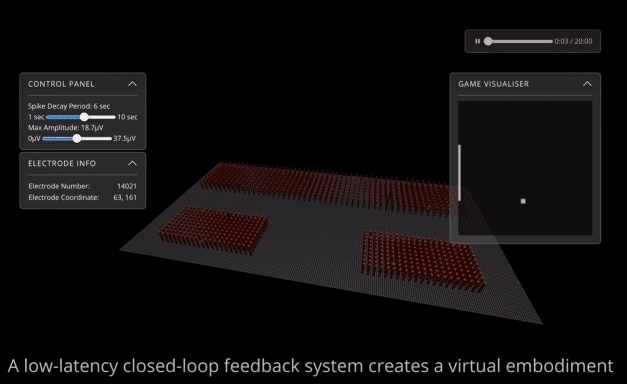
Cortical Labs scientists managed to train DishBrain to play a Pong game. (Image Credit: Cortical Labs)
Scientists at biotech start-up Cortical Labs have taught DishBrain, a brain cell culture consisting of 800,000 cells, how to play a Pong game. They say this is the first-ever demonstration of a mini-brain performing goal-directed tasks. DishBrain receives data from an external source and processes it before responding in real time. “DishBrain offers a simpler approach to test how the brain works and gain insights into debilitating conditions such as epilepsy and dementia,” says Dr. Hon Weng Chong, Chief Executive Officer of Cortical Labs.
So, how does it work? The team put human cells (from stem cells) and mouse cells (from embryonic brains) atop an electrode array connected to a Pong game. Distributing electrical pulses to the neurons determined the ball’s position. Then, the neurons’ signals caused the paddle to move up and down. A strong and consistent feedback signal transmits to DishBrain whenever the paddle touches the ball. If the ball missed, which happened often, then it would supply a short, random pulse instead.

The DishBrain cells were viewed under a microscope. (Image Credit: Cortical Labs)
However, DishBrain doesn’t have any consciousness due to its primitive state, but it still learned within five minutes of real-time gameplay not seen in control conditions. The mini-brain improved its Pong gameplay after playing for just twenty minutes. According to the team, this means the cells reorganized, developed networks, and learned.
“This new capacity to teach cell cultures to perform a task in which they exhibit sentience – by controlling the paddle to return the ball via sensing – opens up new discovery possibilities which will have far-reaching consequences for technology, health, and society,” says Dr. Adeel Razi, Director of Monash University’s Computational & Systems Neuroscience Laboratory.
The team plans to explore how medicine and alcohol impact DishBrain’s Pong playability. They also hope the tech can help test treatments for neurodegenerative diseases, including Alzheimer’s. The brain culture could become more complex as research advances, but the team is working alongside bioethicists to keep it from gaining consciousness. “We have shown we can interact with living biological neurons in such a way that compels them to modify their activity, leading to something that resembles intelligence,” says lead author Dr. Brett Kagan, who is Chief Scientific Officer of biotech start-up Cortical Labs.
How many cells can create consciousness, if only a simple glimmer? This seems like a horrifying existence, ripe for a science fiction story.
Have a story tip? Message me at: http://twitter.com/Cabe_Atwell
